Horse News
Member
Horses’ Best Friend, Too?
It’s no secret that many horse owners also have dogs. And the plethora of online dog and horse videos hints that the two are natural besties. But do dogs and horses actually get along? And if not, what can you do to ensure they become friends?
From an evolutionary standpoint, horses are prey animals, and dogs are predators. Although each animal is an individual, their natural instincts are not always friendly towards each other. This article provides background on horse and dog behavior and what to consider when introducing the two.
Equine Behavior Basics
Horses are prey animals and have survived for centuries by identifying and quickly responding to threats by predators. Their natural response to the unknown is to assume it is a threat and flee from it.
Horses are also incredibly perceptive, meaning they pick up even the most subtle cues from the environment. Exposing horses to various situations in a positive way can help them respond less explosively to new experiences.
Although training can lessen a horse’s reactivity, if they have a terrible experience, they do not easily forget about it. In terms of a horse’s ability to get along with other animals, having a bad experience makes socialization with another animal infinitely more complex.
This is especially true for socializing horses with dogs, a traditional predator species.
Horses and Other Species
Many horses can be socialized to co-exist with other species, including farm animals and dogs. Introducing a horse to another species takes a fair amount of monitoring to ensure the relationship gets off to a great start on both sides.
Suppose a horse has had a previous negative experience with another animal. In that case, it may be more difficult to facilitate a relationship in the future.
And suppose the horse has been abused or neglected. In that case, they may harbor extreme forms of resource guarding, making putting the horse in with even another horse impossible.
Horses each have their own personalities. If the horse is reactive or significantly territorial, it may never peacefully coexist in close proximity with other animals.
Sometimes a horse’s ability to successfully integrate with other animals comes down to their genetic make-up, personality, and previous experiences with other animals.
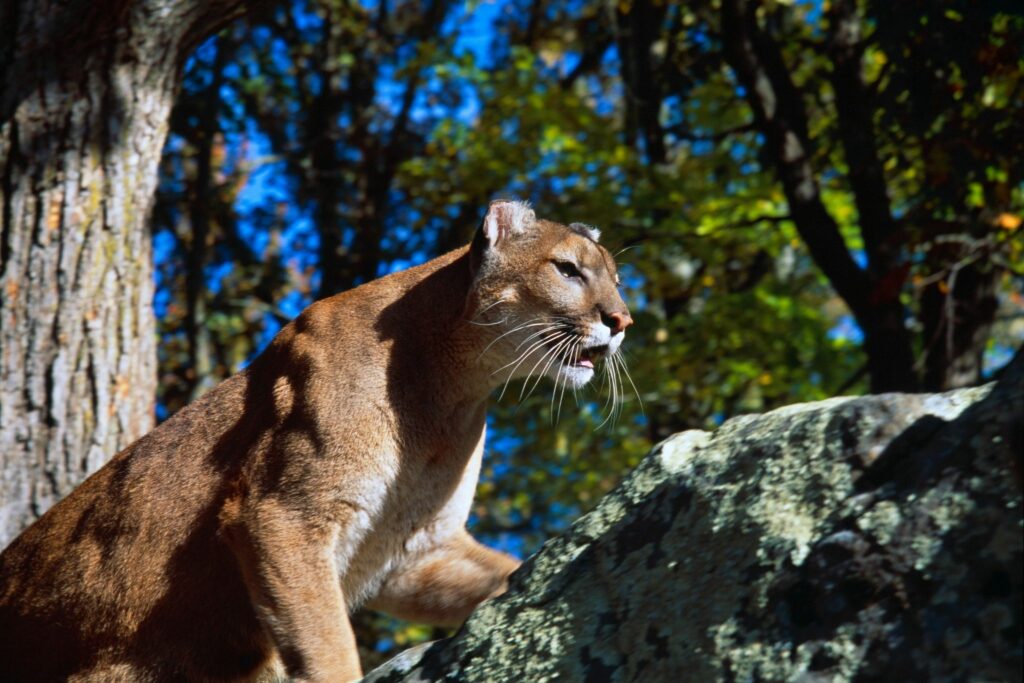
Photo Cred: Canva
Equine Predators
Since the beginning of time, horses have faced possible attacks from various predators. Although the threat of attack to domesticated horses is lower than in the wild, horses continue to harbor a natural instinct to constantly stay alert for possible danger.
A horse’s reaction to a possible threat may seem over-the-top at times, but that reaction is exactly what has kept the species alive.
Several predators have posed threats to horses throughout history, as well as today. Some of the more prominent predators include bears, wolves, and cougars. If you think about it, a dog is eerily similar to a wolf, which sometimes complicates socialization between the two species.
Alligators, wild boars, and coyotes may also pose a predatory threat to horses depending on the geographical location.
It’s also not completely out of the question for a dog to attack a horse. This is another reason why properly socializing dogs with horses is crucial if you hope to bring your dog along to the barn. Both species must show a certain degree of mutual tolerance and respect.
Dog Behavior Basics
Like horses, humans have domesticated dogs to do specific jobs. Eventually, dogs with similar qualities became known as members of individual breeds.
Today, the American Kennel Club registers close to 200 separate dog breeds. Understanding the domestication of dogs is essential because although dogs are individuals, they tend to retain the basic instincts of their breeding.
For example, try to keep a Labrador retriever from diving directly into a cool lake on a hot day. Or try to stop a beagle from chasing a rabbit.
As predators, certain dog breeds may have stronger chase instincts than others. Despite their breeding, and with socialization and training, dogs can learn to accept situations they wouldn’t naturally tolerate.
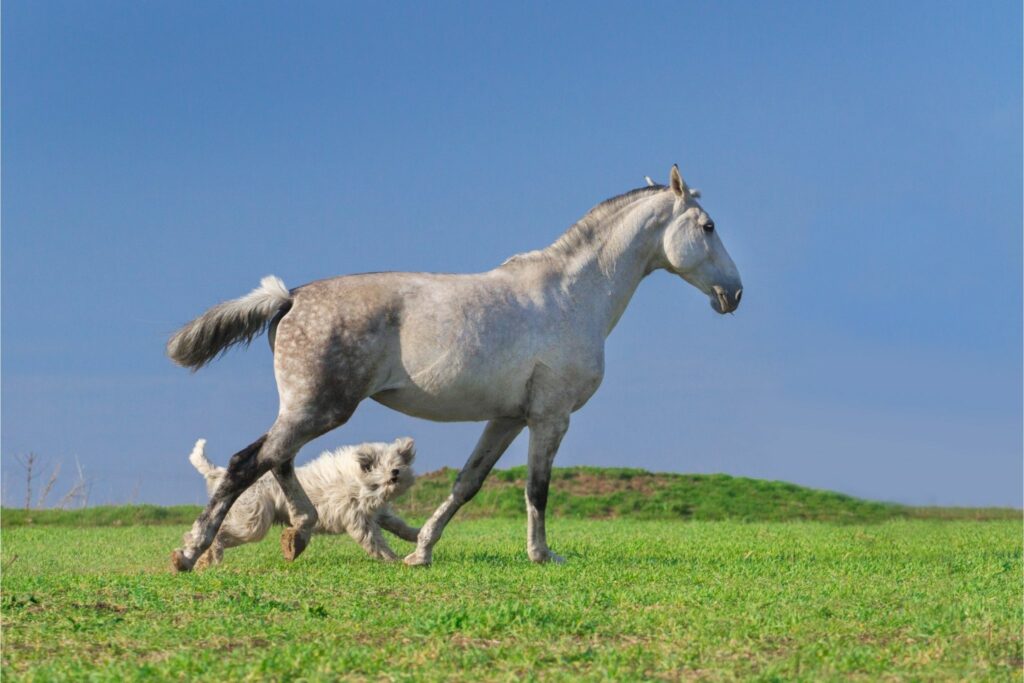
Photo Cred: Canva
Dogs and Other Species
Given their status as predators, many dogs have a natural tendency to chase prey animals. But with appropriate training and socialization, they can be taught to appropriately interact with a wide range of other animals, including cats, goats, pigs, and horses.
Teaching a dog how to interact with other species starts at a very young age.
Before 3 months of age is the best time to introduce your dog to various people, animals, and situations. At this age, puppies form lifelong impressions of the world. If you can make those experiences positive, you set your dog up for a lifetime of friendly and accepting behavior.
Dogs who have not been well socialized as puppies can also be trained to interact with other animals, but it may take more work. Dogs who display fearful or aggressive behavior may require the help of a professional dog trainer.
Even with extra training, they may never be able to be trusted around other animals.
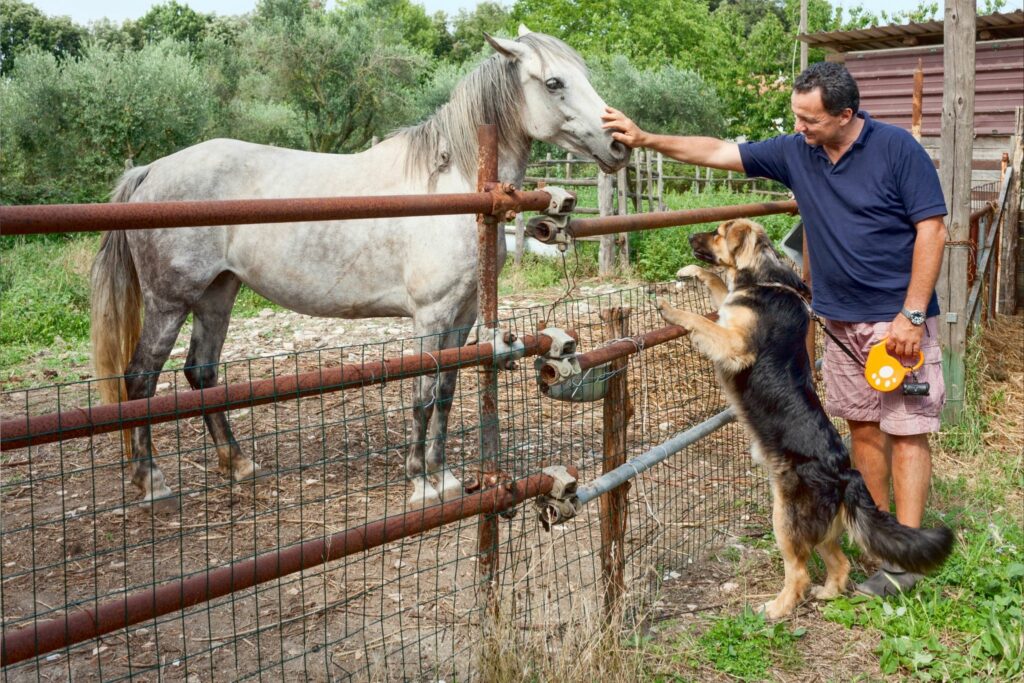
Photo Cred: Canva
How to Introduce Your Dog to Your Horse
Successful introduction between your horse and dog requires some work on your part. And as horses and dogs are individuals, their natural degree of reactivity plays a role in how well they can interact with other animals.
With that being said, there are a few ways you can help ensure things between the two get off to a great start.
Strategy
Ideally, the introduction between your horse and dog should start when your dog is a puppy. The best way to approach an initial introduction is at a distance.
Start by taking your leashed dog on a walk outside the pasture where your horse is grazing. Carefully observe how your dog reacts to the horse. Does he simply look at the horse and go about his business? Or does he bark at the horse?
Reward calm behavior by giving your dog his favorite treats. And if your dog barks or growls, say “no” and come back to try again on a different day.
It may take several days or even weeks to get your dog to accept your horse’s presence. On the other hand, some dogs have more accepting personalities, and it will seem like the two have been best friends since the beginning.
For more in-depth information on introducing your dog and horse (especially if it hasn’t been easy), check out our article about horses and dogs.
If It Doesn’t Go Well…
If your horse or dog is very reactive, you may need help from a professional. Consult a trainer if your dog continues to bark or growl at your horse.
If your horse snorts, paws, or pins his ears back at your dog, you could consult a professional horse trainer for tips on how to change their behavior.
Remember that not all dogs and horses are destined to be besties. Sometimes it’s best and safest for you to enjoy your animals separately rather than risk injury to either them, or you.
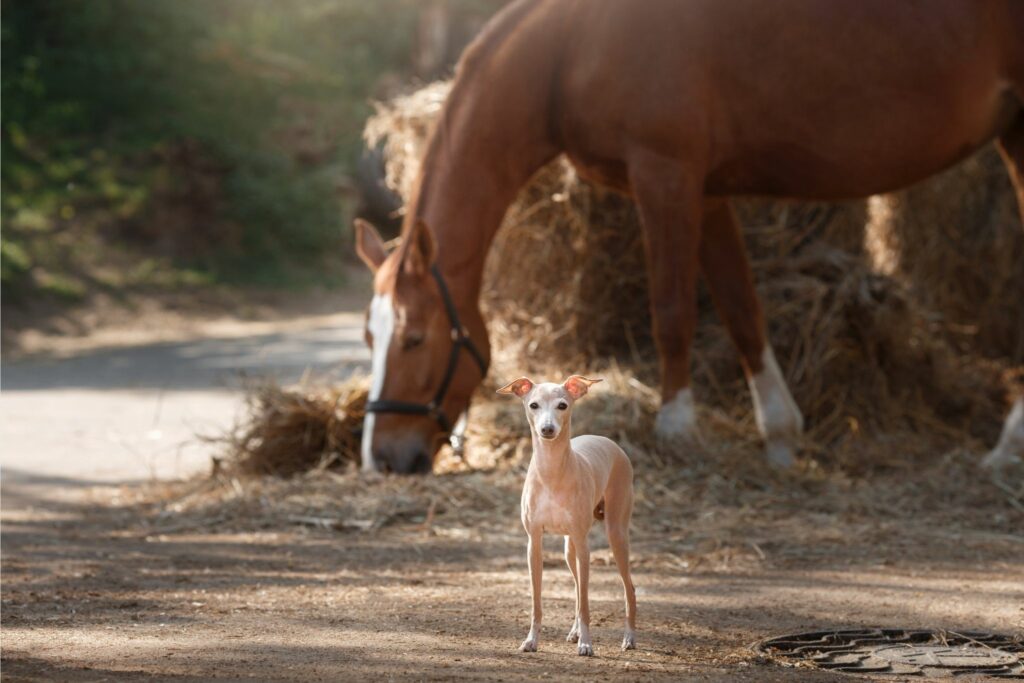
Photo Cred: Canva
Barn Dog 101
A barn dog has been adequately socialized and proven its ability to appropriately interact in all situations they may encounter. They are typically obedient and understand that certain areas are off-limits.
Most barns have rules about what outside dogs can and cannot do on the property.
This is for the protection of everyone involved. Regardless of the individual barn’s rules, your dog should have the basics of obedience down and have a friendly disposition toward other people and animals.
Barn Dog Manners
A good barn dog is friendly, but not overly so. They are willing to interact with people but are just as happy to go about their business if someone doesn’t want to interact.
Barn dogs understand that there are places they shouldn’t go, such as in a stall with a horse or in the riding arena.
They have also been taught to interact with cars and other moving machinery around the barn.
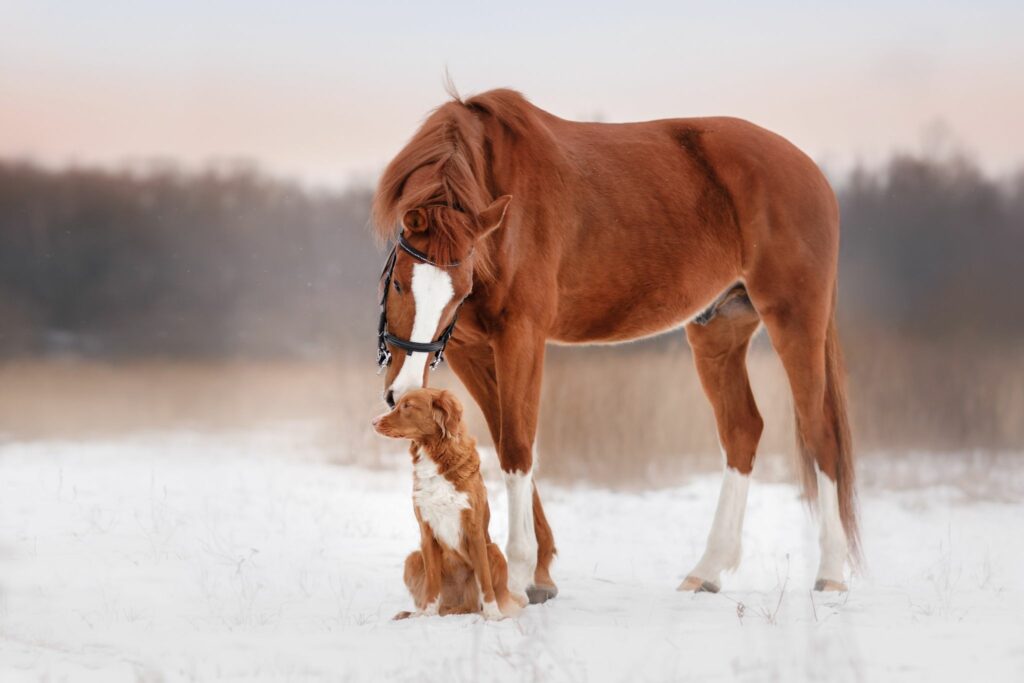
Photo Cred: Canva
Barn Dog Commands
A barn dog should have a solid understanding of the following commands:
- Come
- Leave it
- Sit
- Stay
- Down
- Off
Why do some horse barns ban outside dogs?
A barn dog needs to have mastered a specific set of skills and commands. They need to interact appropriately with a wide range of people and animals. This type of socialization and training takes a long time to master.
Most outside dogs have not had the type of exposure to a barn setting that barn dogs have had.
Depending upon the size of the barn, allowing outside dogs on the property can be a safety hazard to people and the resident barn animals.
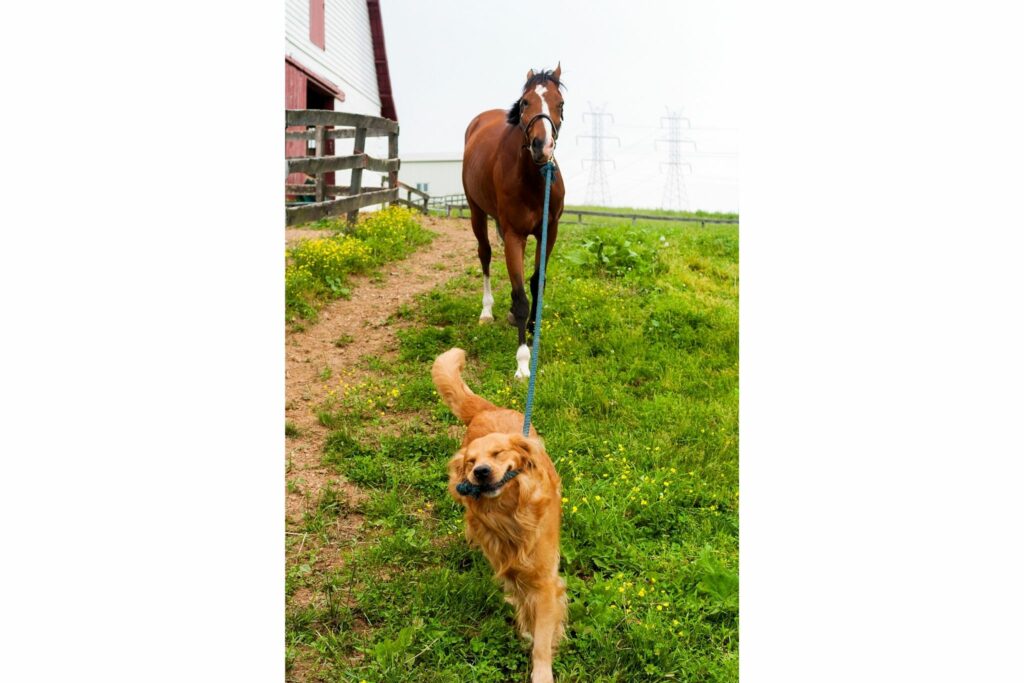
Photo Cred: Canva
Frequently Asked Questions
Q: Are horses OK with dogs?
Horses are prey animals while dogs are predator animals, so they are not natural companions. With training and appropriate socialization, dogs and horses can learn to accept and even enjoy the other’s company.
Q: Do horses like dogs?
Horses can be socialized to accept the presence of dogs. If a horse has had a prior negative experience with a dog, socializing may be difficult or impossible.
Q: Can horses and dogs be friends?
Yes! Play behavior in animals generally presents as mirrored behavior, meaning one animal will imitate the other animal’s behavior. Although a relatively new area of research, there are many videos of horses and dogs mirroring the other’s behavior playfully.
Q: Are horses aggressive towards dogs?
If a horse has had a history of previous neglect or attack from a dog, it can become aggressive toward dogs.
Q: Are horses like dogs?
Horses and dogs are both intelligent, enabling us to train them to high levels. In terms of their relationship with humans, both dogs and horses have been bred throughout time for specific jobs.
Examples include thoroughbred racing or bird hunting with Labrador retrievers.
Dogs and horses are each highly social animals, a second factor that supports their trainability. Both animals have traditionally been part of a larger social structure, horses as part of herds and dogs as part of packs.
Parting Thoughts
Dogs and horses are more alike than one would initially guess when you think about it. After all, both species are highly intelligent, social, and trainable animals. And with a bit of work, they can learn to tolerate, and even like, the other species. If you want more in-depth information on introducing your dog and horse, check out part 2 of this series!
P.S. If you enjoyed this article, trot on over to:
- 6 Tail-Waggin’ Tips for Trail Riding with Your Dog
- Ultimate Beginner’s Guide to Horseback Trail Riding at Night
- Happy Trail Gear Guide: What to Wear Horseback Trail Riding
- 7 Best Satellite Phones for Horse Riders Who Need Help NOW
- The Ultimate Horse Trailering & Packing Checklist
- 6 Best Saddle Pads for Trail Riding and Happy Horses
Sources
Basics of Equine Behavior – Extension Horses
How Horses Get Along With Other Species – The Open Sanctuary Project
What Animals Attack Horses? 8 Predators (With Pictures) | Pet Keen
Horses and dogs share a surprisingly common language of play (nationalgeographic.com)
Does Dog Breed Affect Behavior? In a Word, Yes. – American Kennel Club (akc.org)
Breeds by Year Recognized – American Kennel Club (akc.org)
How to Introduce a New Dog to Horses (horseandrider.com)
Puppy Socialization: How to Socialize a Puppy (akc.org)
5 expert tips to help you introduce a dog to horses – Horse & Hound (horseandhound.co.uk)
How to Introduce a New Dog to Horses (horseandrider.com)
The post Dogs + Horses: Can They Actually Get Along? appeared first on Horse Rookie.
Continue reading...
